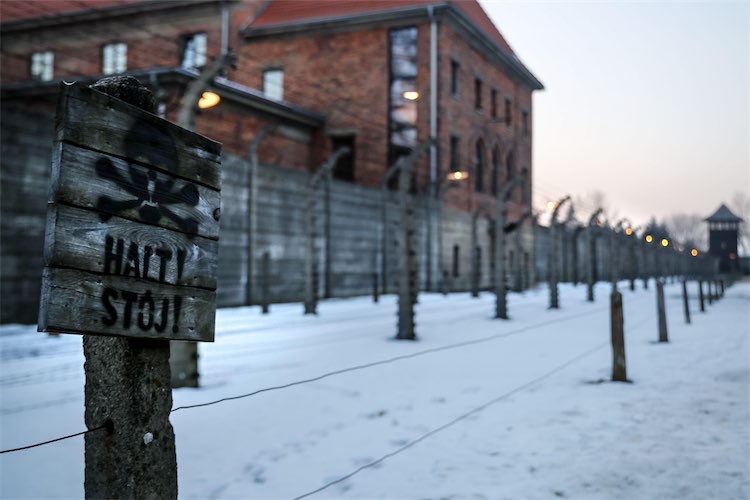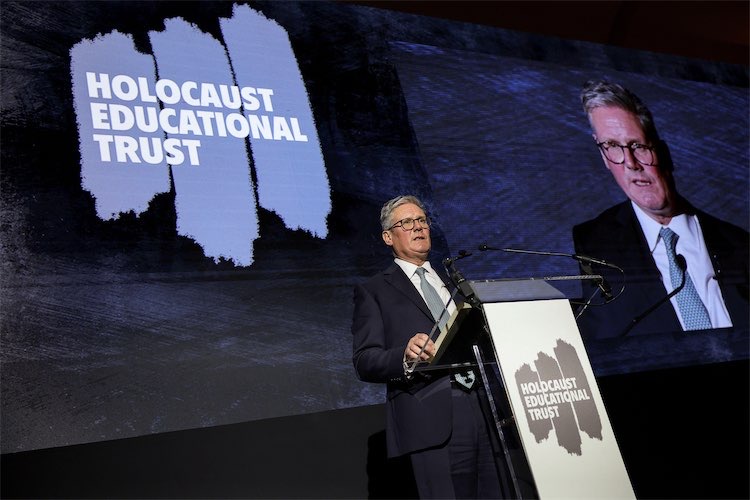MP And Son Of Holocaust Survivor: “It Falls To Us To Tell The Millions Of Little Stories"
Labour MP David Pinto-Duschinsky signed the Holocaust Educational Trust's Book of Commitment (David Pinto-Duschinsky)
7 min read
More than 80 years after his father’s remarkable escape from the Holocaust, Labour MP David Pinto-Duschinsky spoke to Zoe Crowther about why it is everyone’s responsibility – now more than ever – to preserve the memory of all genocides for future generations.
Monday 27 January is Holocaust Memorial Day and the 80th anniversary of the liberation of Auschwitz by the Soviet Army. For David Pinto-Duschinsky, who was elected as Labour MP for Hendon last year, the anniversary is deeply personal.
Between May and July of 1944, after the Nazi Germany occupation of Hungary, more than 434,000 Hungarian Jews were deported on 147 trains. Most were sent to Auschwitz concentration and extermination camp, where 80 per cent were killed in gas chambers on arrival. On 5 May 1944, Pinto-Duschinsky’s father Michael, at not even a year old, was smuggled out of a Jewish ghetto in Hungary shortly before the occupants were transported to death camps.
Michael’s escape came down to his family’s perseverance to survive; they found a Christian woman named Maria, who agreed to travel to the ghetto from Budapest and pose as Michael’s mother with fake papers, before transporting the infant away to safety.
Many other members of Pinto-Duschinsky’s family were not so fortunate. A few years ago, he took his family to Yad Vashem, Israel’s official Holocaust Memorial Museum, which holds a list of the names of every single victim of the Holocaust. “We searched for just my grandmother’s maiden name in her hometown, and we found almost 200 people,” Pinto-Duschinsky said.
“That really brought home the scale of the loss, but also the extraordinary nature of my father’s survival.”
 27 January will mark the 80th anniversary of the liberation of Auschwitz concentration camp (Alamy)
27 January will mark the 80th anniversary of the liberation of Auschwitz concentration camp (Alamy)
For Pinto-Duschinsky, while the “big story” of the Holocaust is written in the history books, the “millions of little stories” give “texture” and communicate the “full scope of the story of the Holocaust that is passed on to us”.
His story reminded me of my own family. My great-grandmother, from whom I take my middle name, was the daughter of a Hungarian Jewish journalist. She escaped to England in 1941 with my grandmother and her twin as small babies on the last boat from Belgium before the Nazis invaded.
The torch is passing to my generation, to your generation
As I sat with Pinto-Duschinsky, he urged me to continue to tell my own family’s story too, insisting it is “everyone’s responsibility” to keep their memories alive.
“It’s the last major anniversary where we will have a significant number of survivors themselves alive,” he said. “With the progression of time, the Holocaust is passing out of human memory. The torch is passing to my generation, to your generation, and with it the responsibility to nurture the memory of the Holocaust. That falls to us. Another lesson is that it must never just be up to the victims.”
He referred to other major genocides where hundreds of thousands of people have been killed, including in Rwanda, Darfur, Cambodia, and Bosnia, saying: “It’s important we give a voice to all of those; that we show that this is a universal human problem that requires universal action.”
The MP described the victims of these genocides as the “victims of politics”, explaining that the lesson he learnt from his own family background is that “you’ve got to get involved and cannot stay on the outside”.
The idea that the son of that infant would be sat in the British Parliament is extraordinary
It was clear that this sense of historical duty motivated Pinto-Duschinsky to enter politics. At the start of his career, a “great politician” told him his full name was a “mouthful” and recommended he shorten it to David Pinto.
“I didn’t even consider it,” Pinto-Duschinsky said. “There are days I can barely pronounce it, but that inconvenience is a small price to pay for the pride I feel of my family’s survival and my desire to carry that badge to keep the family name alive.
“It’s had a huge formative effect, partly because it’s just put me in complete awe of the promise of Britain. My father came here with almost nothing, and because of a life he built, I’m sitting with you today as an MP. If I think back to that railway station in May 1944, the idea that the son of that infant would be sat in the British Parliament is extraordinary.”
The Jewish MP is now a vice-chair of the All-Party Parliamentary Group Against Antisemitism and led the Holocaust Memorial Day debate in Parliament.
 Prime Minister Keir Starmer spoke at the Holocaust Education Trust appeal dinner in September (Alamy)
Prime Minister Keir Starmer spoke at the Holocaust Education Trust appeal dinner in September (Alamy)
Earlier this month, the Anti-Defamation League (ADL) said antisemitism was becoming a “global emergency”, after finding that anti-Jewish sentiment in the UK is at a record high. Their survey found that almost 40 per cent of British adults believe that Jews are more loyal to Israel than the UK, up from 27 per cent when the study was last conducted in 2014. The Community Security Trust reported 5,583 antisemitic incidents across the country between 7 October 2023 and 30 September 2024 – the highest tally recorded in any 12-month period since its records began.
The Labour Party is fundamentally, completely and permanently changed
“There is no denying that there is a huge challenge with antisemitism in Britain,” Pinto-Duschinsky said.
However, he said antisemitism in the Labour Party is no longer the problem it once was. “Under the previous leadership, Labour went to a very dark place, and there was no excuse for that. But under Keir, it is so fundamentally, completely and permanently changed. This is why I am very confident that British Jews can and should make their home in Labour, and I’m really proud to represent the party.”
Addressing the Holocaust Education Trust in September, Prime Minister Keir Starmer pledged £2.2m to the trust and announced that all schools would have to teach students about the Holocaust under the new school curriculum.
According to Pinto-Duschinsky, this is now more important than ever, as most young people get their news and information primarily from social media. For the Hendon MP, continuing to learn about the Holocaust is vital because we are “living in an age of disinformation, where history can be rewritten and the truth can fade”.
"I’m very worried about the impact of social media and its ability to drive division,” he said. “Prejudice is an incredibly light sleeper, and old hatreds are not always that far from the surface; they have never completely gone away.
“In this age of disinformation, it’s up to us to tend that flame, and part of that is about being resolute in the defence of that historical truth.”
The best tonic to disinformation is to call it out
Pinto-Duschinsky added that he “utterly rejects” politicians who deliberately create division – although he avoided saying who he is specifically referring to.
While he pointed to “disinformation and lies we’ve seen online in the last week”, he said he has not considered leaving X, the social media platform owned by controversial US billionaire Elon Musk.
“I don’t think the best answer to dealing with disinformation is to desert public spaces,” the MP insisted. “The best tonic to disinformation is to call it out, and you have to be present in these spaces to call it out.”
In the lead-up to Holocaust Memorial Day, Pinto-Duschinsky said there is a sense of “urgency” among survivors to make sure their stories are told as their generation gets older.
“The other thing I hear from them is a real optimism about the next generation,” he said. “So many will talk about the amazing experiences they’ve had in engaging with young people from all backgrounds in telling their story. This is why survivor testimony is so important – for the next generation, it brings it to life in a way that a history book may often struggle to.”
